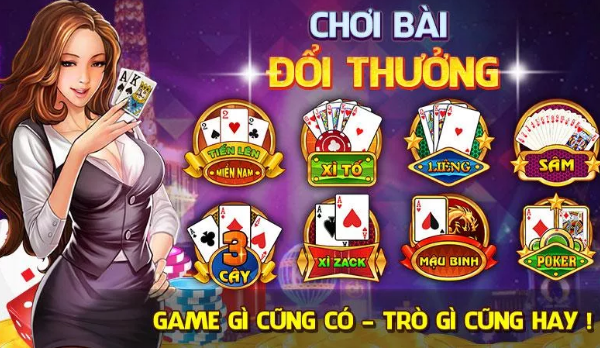The popularity of "game bài đổi thưởng" (reward card games) in Vietnam has been met with both enthusiasm and skepticism. As a trend that continues to grow, it’s important to understand both the opportunities and challenges that accompany these types of games. From offering attractive rewards to presenting regulatory and social risks, this article delves into the double-edged sword of reward card games and how players and authorities alike are responding.
A Closer Look at "Game Bài Đổi Thưởng"

The concept of "game bài đổi thưởng" revolves around familiar card games, such as Tiến Lên, Mậu Binh, or Baccarat, where players compete to win virtual chips that can later be converted into cash or other tangible prizes. Many gaming platforms now offer these games through mobile apps or web-based interfaces, making it easier than ever for players to access these games anywhere, anytime.
A significant feature of these card games is the element of skill involved. Unlike traditional gambling, where outcomes are purely based on luck, reward card games often reward players with a strategic edge. Players who are good at calculating odds, predicting opponents' moves, and managing their resources tend to fare better. This element of skill, combined with the potential for tangible rewards, is part of what makes these games so alluring.
Opportunities in the Market
The market for "game bài đổi thưởng" is still expanding in Vietnam, with numerous opportunities for growth. The widespread availability of smartphones and a growing internet user base provide fertile ground for game developers. This segment has also attracted investment from both domestic and international companies looking to capitalize on the rising popularity of mobile gaming.
Social interaction is another key selling point of these games. Players can interact with friends or join new communities online, enhancing their gaming experience with shared achievements and friendly rivalries. Game developers have also tapped into this aspect by creating various in-game events, tournaments, and challenges that provide additional incentives for players to return.
Moreover, game developers are increasingly adding in-game purchases and special promotions to enhance user retention and monetization. Microtransactions have proven to be a profitable model for these games, allowing companies to keep the games free to play while offering added benefits to those willing to spend.
Challenges Faced by Players and Developers
While the rewards and potential earnings of "game bài đổi thưởng" are enticing, there are significant challenges that come with this type of gaming. One of the primary concerns is the risk of addiction. Like other forms of gambling, the thrill of winning can become compulsive, leading players to spend more money and time than they originally intended. This problem is exacerbated by the seamless availability of these games through mobile devices.
Another major challenge is the legal status of reward card games in Vietnam. The regulatory environment remains uncertain, with gambling laws that often classify these games in a gray area. Despite operating with virtual currency, some platforms have faced scrutiny for enabling what could be considered illegal gambling. Developers must navigate these regulatory challenges carefully, adapting their offerings to stay within legal limits.
Additionally, the social stigma associated with gambling presents a barrier. Although reward card games are positioned as games of skill rather than pure gambling, many players face negative perceptions from family and society. Concerns about financial risk and irresponsible spending add to the cautious attitude many people have towards these games.
The Role of Responsible Gaming
The concept of responsible gaming has begun to gain traction among reward card game developers. Platforms are starting to introduce limits on spending, reminders for players to take breaks, and self-exclusion tools to help players control their gaming habits. These measures aim to mitigate the risks associated with excessive gaming and help foster a healthier relationship with these games.
Game developers are also working on educational campaigns that inform players about the risks involved and provide tips for maintaining balance. Transparency in terms of win rates, and the introduction of features that promote healthy competition rather than compulsive spending, are steps being taken to make the industry more sustainable.
Conclusion
"Game bài đổi thưởng" offers a unique blend of excitement, skill, and reward, which explains its popularity in Vietnam. However, both players and developers face challenges that need to be addressed for the market to grow responsibly. While opportunities in the market are promising, the risks cannot be overlooked—particularly concerning addiction and regulatory uncertainties.
As reward card games continue to gain traction, a balanced approach that emphasizes responsible gaming, clear regulations, and player protection is crucial. With the right balance, these games could become a staple of Vietnam's digital entertainment landscape, offering fun and rewarding experiences without compromising player welfare.


